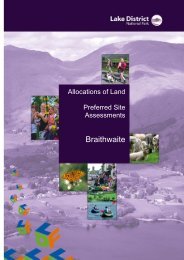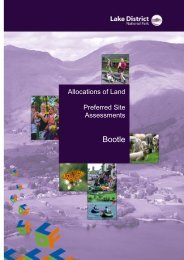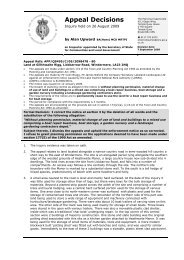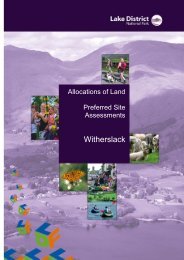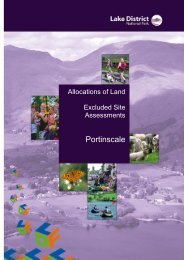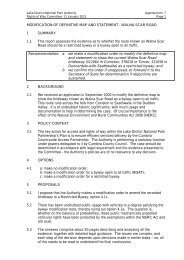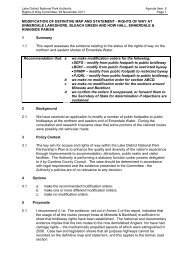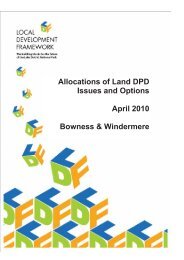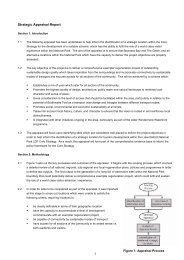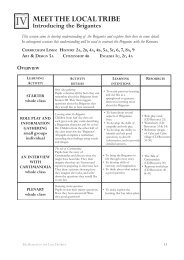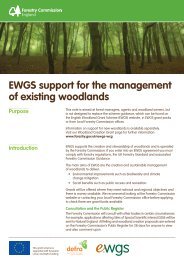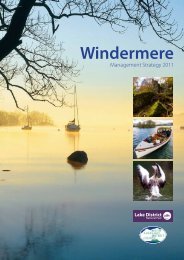The Partnership's Plan - Lake District National Park
The Partnership's Plan - Lake District National Park
The Partnership's Plan - Lake District National Park
You also want an ePaper? Increase the reach of your titles
YUMPU automatically turns print PDFs into web optimized ePapers that Google loves.
• We have:<br />
o 36,420 hectares of European sites designated for their biodiversity<br />
o 41,810 hectares of Sites of Special Scientific Interest<br />
o 14,080 hectares of Local Wildlife sites<br />
o 16 European Protected Species and<br />
o 173 priority species and 35 priority habitats identified by the UK Biodiversity<br />
Action <strong>Plan</strong>.<br />
• Eighteen per cent of the <strong>National</strong> <strong>Park</strong> is designated as Sites of Special Scientific<br />
Interest of which 87.4 per cent is in favourable condition or unfavourable but recovering<br />
(2009). This is a dramatic improvement compared to 2003 when only 48.1 per cent<br />
were in favourable or recovering condition. More than 30 per cent of local wildlife sites<br />
are being managed positively for conservation.<br />
• <strong>The</strong> way we use, manage and develop land significantly affects wildlife. Despite the<br />
number and extent of our designated sites we have witnessed a considerable decline<br />
of some habitats and species since the 1940s. Some Sites of Special Scientific Interest<br />
are degraded and we are losing our biodiversity, particularly farmland birds,<br />
haymeadows and iconic indicator species such as golden eagle and black grouse.<br />
• Landscape change has brought its challenges. Poor design can introduce an<br />
inappropriate suburban element to a rural setting. Small changes in sensitive locations,<br />
such as installation of telecommunications masts, can spoil the scene. Inappropriate or<br />
excessive lighting can deny views of the night sky. Large numbers of visitors in one<br />
area can affect tranquillity.<br />
• Water management of river basins and the lakes is central to our landscape. Water<br />
quality has been declining due to diffuse agricultural pollution, erosion and detergent<br />
use. This affects bathing and safety and is a symptom of failing ecosystems. <strong>The</strong><br />
drought conditions of 2010 highlighted the impact of excessive drawdown of lakes used<br />
for water supply. <strong>The</strong>re were profound effects on biodiversity, views and recreation.<br />
Water supply security can affect development and sustainable water use needs to be<br />
promoted. We will address concerns about naturalising rivers and future flood-proofing.<br />
<strong>The</strong> landscape will continue to change as we seek to protect the ‘<strong>Lake</strong>s’ brand.<br />
3.15.2 Recent activity and successes<br />
Habitats provide many of the products and services that are essential for well-being and<br />
economic prosperity such as clean water and air, high quality food, wood products and locking<br />
up carbon. When these habitats are in good condition they provide better quality and quantity<br />
of these products and services. We call these products and services from the environment<br />
ecosystem services. In 2010, Natural England started a one year project as one of three<br />
national pilots to better understand the ecosystem services of the Bassenthwaite catchment<br />
and develop land management options.<br />
Charismatic species-based projects are also being delivered. For example, the Osprey Project<br />
at Bassenthwaite attracts up to 100,000 visitors a year to see the only naturally colonised<br />
breeding pair of ospreys in England. Red Squirrel conservation attracts huge local support and<br />
voluntary effort.<br />
In 2007, the <strong>National</strong> <strong>Park</strong> Authority established the Windermere <strong>Lake</strong> User Forum, to advise<br />
and guide delivery of the Windermere Management Strategy.<br />
61



